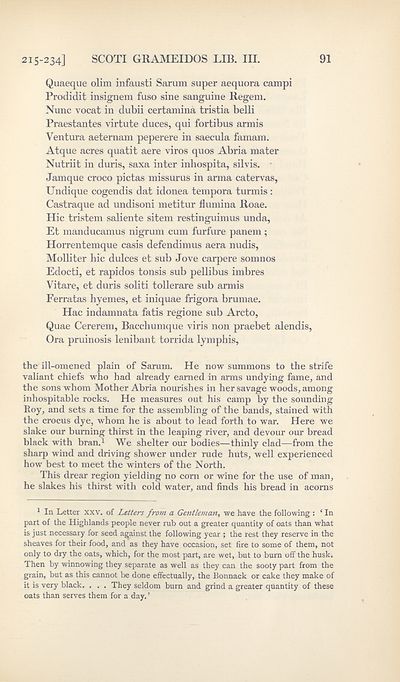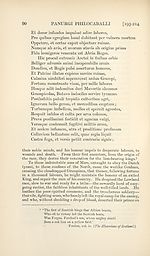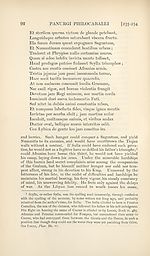Series 1 > Grameid: an heroic poem descriptive of the campaign of Viscount Dundee in 1689, and other pieces
(162) Page 91
Download files
Complete book:
Individual page:
Thumbnail gallery: Grid view | List view

91
215-234] SCOTI GRAMEIDOS LIB. III.
Quaeque olim infausti Sarum super aequora campi
Prodidit insignem fuso sine sanguine Regem.
Nunc vocat in dubii certamina tristia belli
Praestantes virtute duces, qui fortibus armis
Ventura aeternam peperere in saecula famam.
Atque acres quatit acre viros quos Abria mater
Nutriit in duris, saxa inter inhospita, silvis.
Jamque croco pictas missurus in arma catervas,
Undique cogendis dat idonea tempera turmis :
Castraque ad undisoni metitur flumina Roae.
Hie tristem saliente sitem restinguimus unda,
Et manducamus nigrum cum furfure panem ;
Horrentemque casis defendimus aera nudis,
Molliter hie dulces et sub Jove carpere somnos
Edocti, et rapidos tonsis sub pellibus imbres
Vitare, et duris soliti tollerare sub armis
Ferratas hyemes, et iniquae frigora brumae.
Hac indamnata fatis regione sub Arcto,
Quae Cererem, Bacchumque viris non praebet alendis,
Ora pruinosis lenibant torrida lymphis,
the ill-omened plain of Sarum. He now summons to the strife
valiant chiefs who had already earned in arms undying fame, and
the sons whom Mother Abria nourishes in her savage woods, among
inhospitable rocks. He measures out his camp by the sounding
Roy, and sets a time for the assembling of the bands, stained with
the crocus dye, whom he is about to lead forth to war. Here we
slake our burning thirst in the leaping river, and devour our bread
black with bran.1 We shelter our bodies—thinly clad—from the
sharp wind and driving shower under rude huts, well experienced
how best to meet the winters of the North.
This drear region yielding no corn or wine for the use of man,
he slakes his thirst with cold water, and finds his bread in acorns
1 In Letter xxv. of Letters from a Gentleman, we have the following : ‘ In
part of the Highlands people never rub out a greater quantity of oats than what
is just necessary for seed against the following year ; the rest they reserve in the
sheaves for their food, and as they have occasion, set fire to some of them, not
only to dry the oats, which, for the most part, are wet, but to burn off the husk.
Then by winnowing they separate as well as they can the sooty part from the
grain, but as this cannot be done effectually, the Bonnack or cake they make of
it is very black. . . . They seldom burn and grind a greater quantity of these
oats than serves them for a day. ’
215-234] SCOTI GRAMEIDOS LIB. III.
Quaeque olim infausti Sarum super aequora campi
Prodidit insignem fuso sine sanguine Regem.
Nunc vocat in dubii certamina tristia belli
Praestantes virtute duces, qui fortibus armis
Ventura aeternam peperere in saecula famam.
Atque acres quatit acre viros quos Abria mater
Nutriit in duris, saxa inter inhospita, silvis.
Jamque croco pictas missurus in arma catervas,
Undique cogendis dat idonea tempera turmis :
Castraque ad undisoni metitur flumina Roae.
Hie tristem saliente sitem restinguimus unda,
Et manducamus nigrum cum furfure panem ;
Horrentemque casis defendimus aera nudis,
Molliter hie dulces et sub Jove carpere somnos
Edocti, et rapidos tonsis sub pellibus imbres
Vitare, et duris soliti tollerare sub armis
Ferratas hyemes, et iniquae frigora brumae.
Hac indamnata fatis regione sub Arcto,
Quae Cererem, Bacchumque viris non praebet alendis,
Ora pruinosis lenibant torrida lymphis,
the ill-omened plain of Sarum. He now summons to the strife
valiant chiefs who had already earned in arms undying fame, and
the sons whom Mother Abria nourishes in her savage woods, among
inhospitable rocks. He measures out his camp by the sounding
Roy, and sets a time for the assembling of the bands, stained with
the crocus dye, whom he is about to lead forth to war. Here we
slake our burning thirst in the leaping river, and devour our bread
black with bran.1 We shelter our bodies—thinly clad—from the
sharp wind and driving shower under rude huts, well experienced
how best to meet the winters of the North.
This drear region yielding no corn or wine for the use of man,
he slakes his thirst with cold water, and finds his bread in acorns
1 In Letter xxv. of Letters from a Gentleman, we have the following : ‘ In
part of the Highlands people never rub out a greater quantity of oats than what
is just necessary for seed against the following year ; the rest they reserve in the
sheaves for their food, and as they have occasion, set fire to some of them, not
only to dry the oats, which, for the most part, are wet, but to burn off the husk.
Then by winnowing they separate as well as they can the sooty part from the
grain, but as this cannot be done effectually, the Bonnack or cake they make of
it is very black. . . . They seldom burn and grind a greater quantity of these
oats than serves them for a day. ’
Set display mode to:
![]() Universal Viewer |
Universal Viewer | ![]() Mirador |
Large image | Transcription
Mirador |
Large image | Transcription
Images and transcriptions on this page, including medium image downloads, may be used under the Creative Commons Attribution 4.0 International Licence unless otherwise stated. ![]()
| Scottish History Society volumes > Series 1 > Grameid: an heroic poem descriptive of the campaign of Viscount Dundee in 1689, and other pieces > (162) Page 91 |
|---|
| Permanent URL | https://digital.nls.uk/126597501 |
|---|
| Attribution and copyright: |
|
|---|
| Description | Over 180 volumes, published by the Scottish History Society, containing original sources on Scotland's history and people. With a wide range of subjects, the books collectively cover all periods from the 12th to 20th centuries, and reflect changing trends in Scottish history. Sources are accompanied by scholarly interpretation, references and bibliographies. Volumes are usually published annually, and more digitised volumes will be added as they become available. |
|---|


